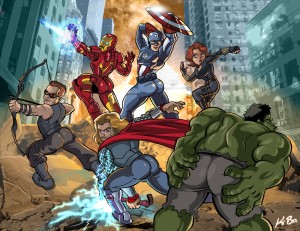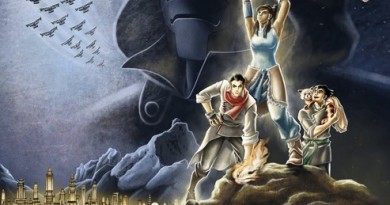Fangirls Around the Web: June 13, 2013
It’s time to spotlight fangirls and the real life and fictional heroines that inspire them for the week of June 12, 2013.
John Morton, the actor who played Dak in The Empire Strikes Back, shares his tale of attending the 1998 Star Ladies convention with the Star Wars Blog. I first heard about the Star Ladies from Randy Stradley at Celebration, and they have been an important part of the fandom for years.
Sometime after my resurrection, I’d been a guest at Ben Stevens’ DFW Toy Show in Plano, Texas. Managing the autograph line was Denise Clarkston, an exercise physiologist who is now with Ben’s Official Pix, the folks who book the “talent” for Celebrations. Denise invited me to be her guest at a Washington convention of the Star Ladies, one of three fan organizations that are now Club Jade. In 1998, their third annual con was in DC during the run of the Smithsonian National Air & Space Museum’s “The Magic of Myth” Exhibition.
Priya shared the link to David M. Perry’s opinion piece at CNN.com, emphasizing the importance of stopping sex stereotypes in raising young girls. Perry makes a very important point, which is that gender stereotypes “are, by their very nature, pernicious. They creep into our minds, shaping our perceptions of the world on a subconscious level, tricking us into betraying our values.” Women are just as capable of perpetuating stereotypes, a point that has been made on this blog previously.
AdWeek reports on the recent controversies surrounding recent issues of the Science Fiction and Fantasy Writers of America’s Bulletin, and asks “Will the Fantasy Genre Ever Grow Up and Ditch the Chainmail Bikini?” In particular, authors Ann Aguirre and Delilah Dawson wrote powerful blog posts on the situation. I commend them for speaking up, and we can all use a reminder that despite the strides for women creators and female characters, the genre still has a long way to go.
So when I say that I’m not going to be quiet anymore, I mean it. I’m not going to let someone talk over me at a panel or tell me I’m worth nothing. I’m not going to be told that “it’s always been this way”, or “boys will be boys”, or “stop complaining and do something”. In this case, complaining *is* doing something.
Because men who belittle women, who turns us into damsels and whores in their books, who speak over us and tell us we’re ruining things– they want the same thing my rapist wanted: for us to stop talking about it.
I’m not saying that sexism in publishing is the same thing as rape. What I *am* saying is that when you expect a woman to shut her mouth and be pretty, to not complain, to accept the fact that you devalue her and her work– you’re taking away her voice and turning her into an object, one that won’t get in the way of your plans.
~Delilah Dawson on her experience as a SFF writer and woman
Lisa Granshaw reports on the new Tumblr blog Repair Her Armor, which redesigns the skimpy attire of female characters from videogames and other sources into more functional (and protective) forms. Anita Sarkeesian at Feminist Frequency has a great new video dissecting the Damsels in Distress trope against women in videogames.
 USA Today again raises the question of Hollywood’s reluctance to make a Wonder Woman movie. ComicsBeat reports on a panel from Denver Comic Con 2013, where four creators discussed why writing Wonder Woman can be “problematic.”
USA Today again raises the question of Hollywood’s reluctance to make a Wonder Woman movie. ComicsBeat reports on a panel from Denver Comic Con 2013, where four creators discussed why writing Wonder Woman can be “problematic.”
Bleeding Cool gender-crunches the creators and titles from DC and Marvel comics for March 2013. They’re both just over 10%, not exactly an inspiring number. Anna Breslaw at Jezebel interviewed Marvel comics editor Jeanine Schaeffer, who’s overseeing the newly launched all-female X-Men comic, and it’s definitely worth the read, particularly for the analysis of how too many comics are still drawn for the male gaze.
Have you seen that picture of The Avengers’ male characters drawn in the style of women? What was your reaction to that?
First of all, I do know what you’re talking about without clicking, which is good because when I tried to click it was blocked at work! So when I get the call from our IT security guy, I’m blaming you guys! I mean, it’s funny cos it’s true, right? It’s absurd, seeing all those dudes posed in come hither poses in the middle of a battle (honestly, Black Widow’s whaaaa? face is the best part about it). The issue, really, is that there are a lot of guys who draw what they want to see, which, you know, to each his own. But it’s that same reason why we need to constantly be on the lookout for more diversity in our creators. Because if everyone is coming from one point of view, you’re gonna get the same stuff over and over again, and it might be stuff that won’t, or can’t, speak to a larger audience.
And it’s a hazard of working in mainstream comics. I’ve definitely worked on books that, looking back on, I wish I had spoken up about the way a woman was portrayed, or the way a woman was drawn. And in some cases, I wish I had even noticed! Those are the worst ones. But I keep them in mind and just try to do better the next time.
How has the development of female superheroes, specifically, changed over the course of your career, if at all?
I think the change is actually more general in that I think the conversation has become ever-present, and it’s causing people to actually examine the process of handling female characters. Because there can’t be change if people don’t acknowledge that a change is needed. I believe that the first step is getting over that knee jerk reaction of, “My female characters are fine! It would be the same if it was a man in their place!” and examining the situation in context, from outside your own limited point of view, and that’s definitely happening.
It’s not just comics, either. The title of Angie Han’s article at Slashfilm speaks for itself: Joss Whedon “Pissed Off” About Lack of Female Superheroes in Film.
Kristen Pham wrote a great blog post illustrating the steps of Joseph Campbell’s Hero’s Journey with examples from prominent and recent stories with female protagonists.
USA Today features Kathleen Kennedy on her career and the future of Lucasfilm.
Take this stance on minorities in Hollywood: “The demographics within our business don’t reflect society, and they certainly don’t reflect the audience. There should be many, many more faces of color, many more women, many more gay people — you could go down the list. I will tell you that most of my meetings are in rooms with white males.”
Kennedy says that because she’s a woman, she “makes a conscious effort to diversify the people I’m hiring. And it needs to come from a place of authenticity, as opposed to putting token people in place.”
Finally, we’ll round this update out with the latest Her Universe Fangirls of the Day: Stefania, Jessica, Alanna, Noel, Leila, Carmen, Tarra, Ashley, Tracey, Ashley, and Robyn.
Tricia Barr took her understanding of brand management and marketing, mixed it with a love of genre storytelling, and added a dash of social media flare to create FANgirl Blog, where she discusses Star Wars, fandom, and strong female characters. She also writes about Star Wars for Random House’s science fiction and fantasy blog Suvudu.com and Star Wars Insider magazine and is a contributor for Her Universe’s Year of the Fangirl.
In her spare time, Tricia puts the finishing touches on her first novel, Wynde. For excerpts and tales of her adventures in creating a fictional universe, hop over to TriciaBarr.com.
For updates on all things FANgirl follow @FANgirlcantina on Twitter or like FANgirl Zone on Facebook.
- Hyperspace Theories: Bad Luck Ghorman - June 2, 2025
- Hyperspace Theories: One Year Later as ANDOR Kicks Off Season Two - May 15, 2025
- REVIEW: Tales of the Underworld - May 4, 2025










